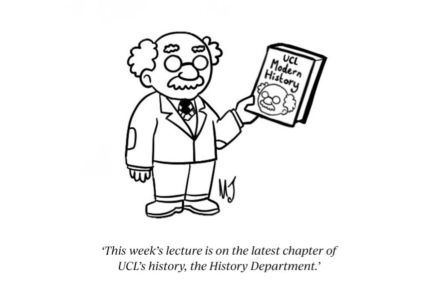Recent changes to the attendance monitoring policy for Tier 4 students in several UCL faculties are generating opposition from staff and students. It is alleged that the new policies not only unjustly target overseas students, but also force teaching staff to act as border officers, making them responsible for enforcing immigration policies.
On 23rd April, overseas postgraduate students at the Institute of Education received an email, outlining a new ‘engagement monitoring’ policy, and reminding them that failure to comply with the new rules will result in ‘curtailment’ of their visa and they will be ‘expected to leave the UK.’

The policy has introduced compulsory checkpoints every ten weeks for postgraduates at the IoE, requiring students to either check in with their supervisor in person or to attend other events that demonstrate engagement and have this signed off by an appropriate staff member. Although perhaps easy for an undergraduate, the checkpoint requirements are highly impractical for PhD students, who frequently conduct research away from their institution for months at a time.
One student at the IoE recalled that a colleague once had to travel outside of London to check in with a supervisor who was on maternity leave. They expressed their frustration at the bureaucratic and infantilising monitoring policy which requires students attending academic conferences to obtain signatures from the conference leaders to prove their engagement.
The new policy also undermines the importance of the work done by postgraduate teaching assistants (PGTAs) as it does not consider their teaching to be a legitimate form of engagement, even though it has clear relevance to postgraduate study at the IoE.
Visa Sponsorship
Rex Knight, the Vice-Provost of Operations, and other representatives of UCL management have met with concerned IoE staff and students, assuring them that the changes were due to a policy that has been uniformly implemented across the university and complies with Home Office guidelines, yet it is clear that policy varies between departments and the guidelines do not stipulate any particular form of engagement monitoring as a Tier 4 visa sponsorship requirement.

Engagement monitoring is nothing new. With the introduction of a points-based immigration system in 2008, universities became visa sponsors, responsible for ensuring their overseas students comply with immigration laws, which includes ensuring that international students are not neglecting their studies.
UCL has been monitoring attendance and engagement for the past ten years, but their methods have been becoming increasingly draconian. Academics at the IoE and other faculties recall that a simple email confirmation used to be enough to prove a student’s engagement, whereas face-to-face meetings are now required.
This places a burden both on students to attend such meetings, and on staff, who must complete copious paperwork to ensure their students are complying with their Tier 4 visa requirements as interpreted by the university.
‘London’s Global University’?
The Home Office demands that universities use an attendance monitoring system that is ‘fit for purpose’. However, it offers little guidance as to how academic institutions should implement such a system. Hence, universities are left to determine for themselves what effective monitoring looks like with the ever-present threat of losing their sponsor status.
In 2012, London Metropolitan University had its Tier 4 sponsor status revoked due to insufficient monitoring of student attendance and other systemic failures, leaving the university’s 2,700 contemporary and prospective overseas students with just 60 days to find another university to sponsor their student visas.
LMU later regained its right of sponsorship, but the fear of a similar fate looms over other institutions, especially those with a high proportion of international students. Many see LMU, the first public university to lose its sponsorship licence, as a ‘test case’.
The fear of losing sponsorships rights for Tier 4 students has led universities, such as Leeds, Exeter and Lancaster, to use a location-tracking mobile phone application to ensure that students are physically attending lectures. There were plans to test this controversial approach at UCL but it was abandoned at the behest of the Student Union.
UCL markets itself as ‘London’s Global University’. In the last academic year, 13,387 UCL students paid overseas fees — 32% of the overall student population.
Given that UK and EU students’ fees barely cover the university’s costs, it is mostly the ever-increasing student numbers and the large number of students paying overseas fees which allow UCL to turn a profit.
It is clear that UCL cannot afford to lose its right of sponsorship. However, many academics and students are dismayed by UCL’s excessive compliance efforts, with some feeling that the university is contributing to the government’s hostile environment policy, and effectively becoming a ‘second border’ which overseas students must cross.
According to a recent survey conducted by the Students’ Union, 70% of Tier 4 students felt discriminated against, and only 38% said they would recommend UCL to other overseas students.
Prof. Judith Suissa of the IoE points to American colleges, some of which refuse to denounce undocumented students to the government and provide such students with support, as examples for how British universities could stand up to government policies on immigration. She argues that a large and prestigious university like UCL could afford to take a stand against the government, a luxury that is not afforded to lesser-known institutions such as LMU. As it stands, UCL places the responsibility for the £20,000-per-case fine for failing to report any breach of a student’s Tier 4 visa requirements squarely at the feet of individual staff members.
UCL is quick to claim its liberal heritage and points eagerly to Jeremy Bentham as its intellectual godfather but it appears that his vision of surveillance via the Panopticon provides more inspiration for the institution than his egalitarianism.
Weronika Strzyżyńska
Image credit: UCL Digital Media, 2018
This article appeared in CG Issue 62.








